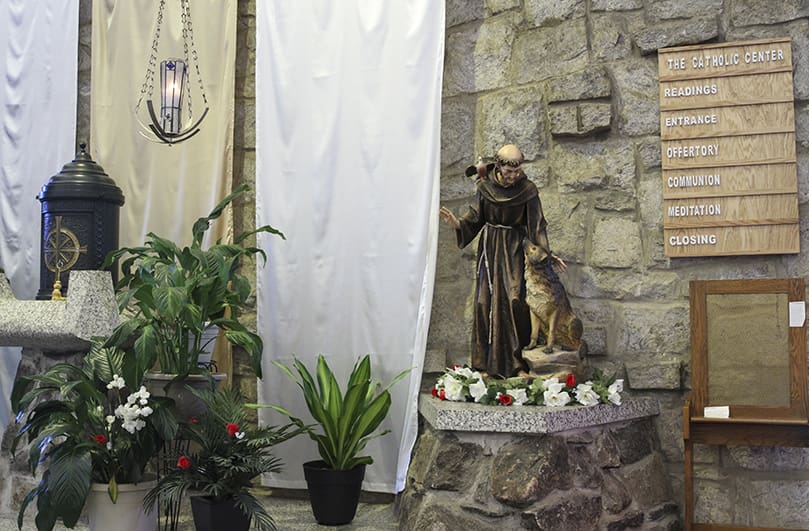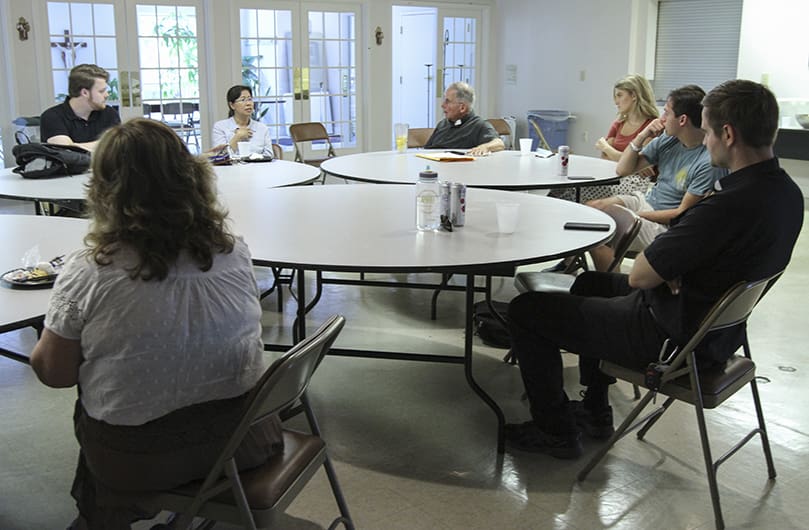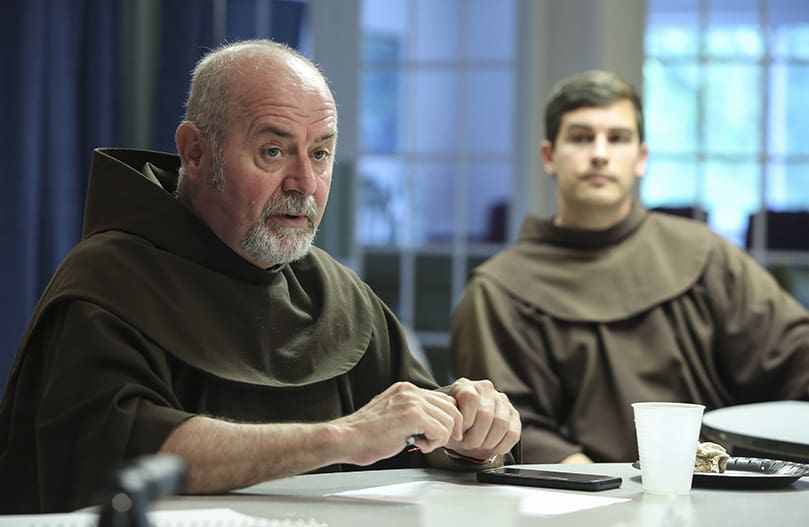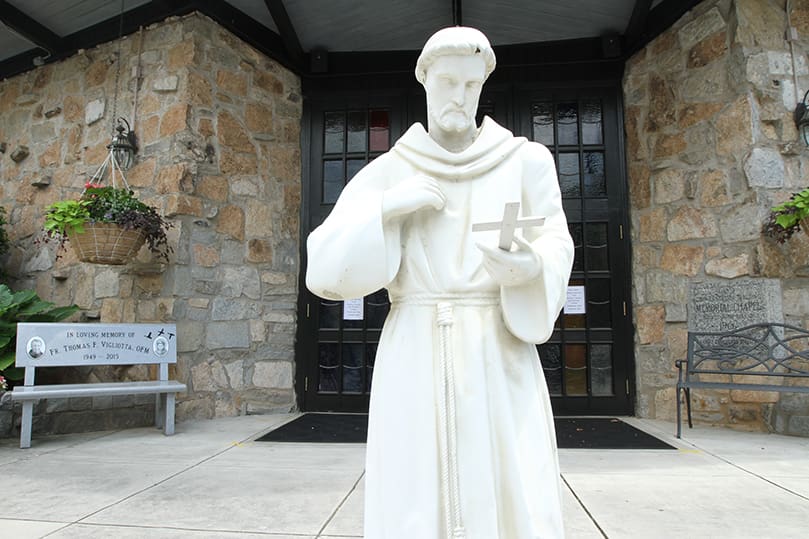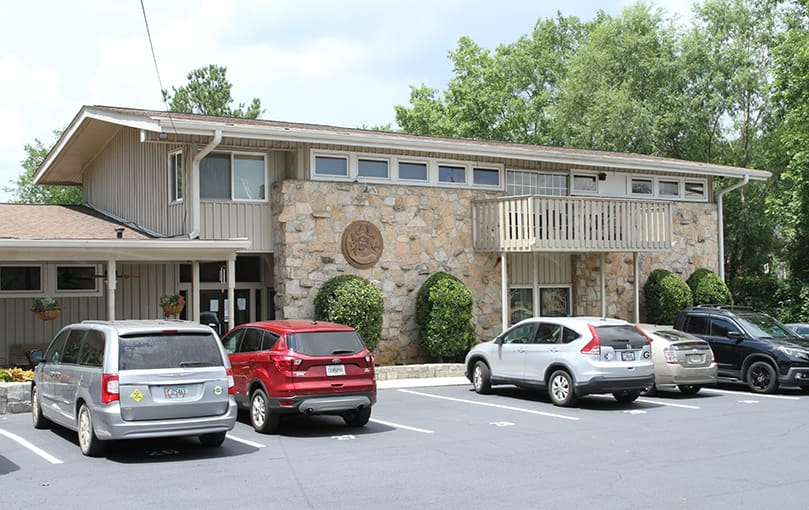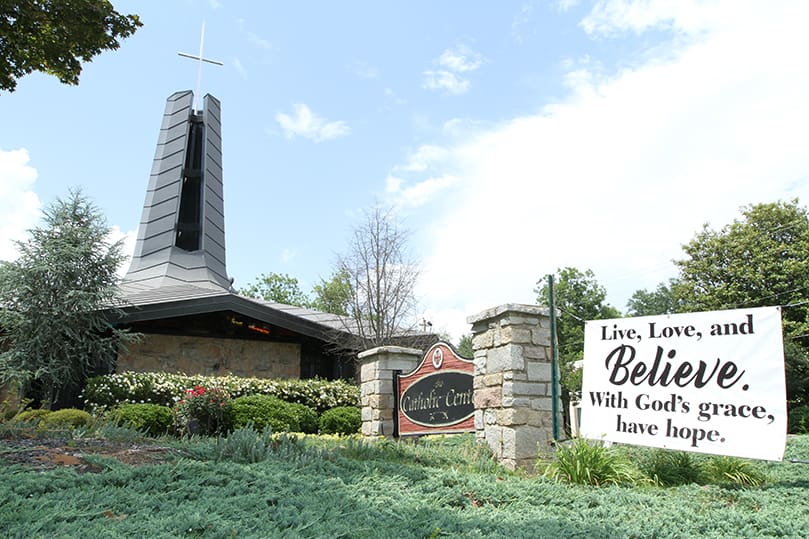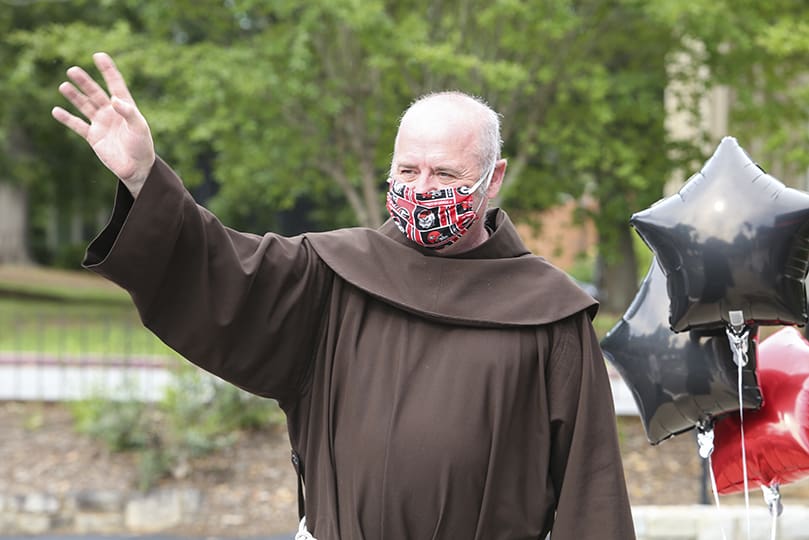Images of St. Francis of Assisi can be found in the Bishop John Lancaster Memorial Chapel and around the Catholic Center at the University of Georgia, Athens. For 62 years the Franciscan Friars of Holy Name Province have provided spiritual direction and leadership, but beginning in July Archdiocese of Atlanta priests will assume that responsibility. Photo By Michael Alexander
Athens
Departing Franciscans leave enduring spirit at UGA Catholic Center
By ANDREW NELSON, Staff Writer | Published June 11, 2020
ATHENS—Kevin Ronczkowski showed up at the freshman BBQ at the UGA Catholic Center during his early days on campus. Someone he knew from his home parish invited him, but otherwise, he didn’t know a soul.
Once there, strangers talked to him as if they’d been friends for years.
“I felt very welcomed,” he said. “There were people at the door greeting me and ready to have a conversation.”
This spirit of warmth and hospitality envelops the hub of Catholic life at the university, said students and community members who worship there. People credit the spirituality of the Franciscan friars for fostering an atmosphere of openness and acceptance.
That’s why Ronczkowski and the community wept at a January Mass when it was announced the Franciscan community would end decades of service. “Everyone was really shocked. It was the hardest Mass to finish,” he said.
The friars in their recognizable brown robes will be leaving at the end of June. Their departure ends some 60 years of ministry at the flagship University of Georgia.
Franciscan values shape future
Community members who cried at that news are drawing on the Franciscan roots planted in the community to guide them into the future.
For Mary Jo Brown, who has prayed at the center since 1971, the Franciscan way is to “live the Gospel; understand the Gospel and live it.”
The director for the past two years has been Father Frank Critch, a former restaurant owner and chef who still whips ingredients together to make surprise meals for students.
The guiding principle here is one of welcome, said the 58-year-old priest. The friars have never been about proselytization, but to “accept people where they are,” said Father Frank. The goal isn’t to drill people about Catholic beliefs but to be “hearing their stories,” he said. “Their stories become part of our stories.”
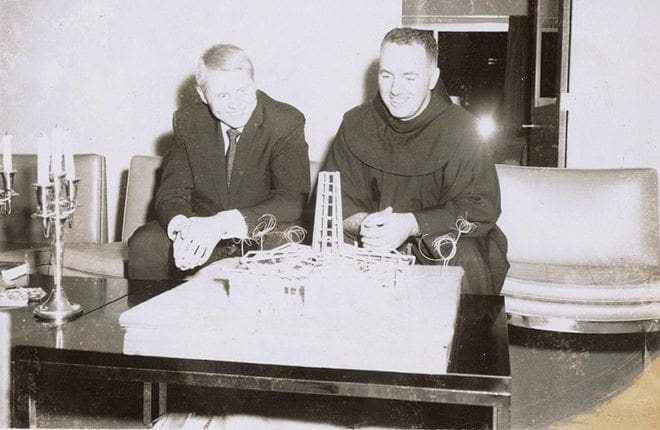
In this photo, first published in February 1967 in The Georgia Bulletin, Ed Steppe, president of Catholic Students at the University of Georgia, and Father Christian Malone, OFM, chaplain, look over a model of the chapel. Photo Courtesy of Archives, Archdiocese of Atlanta
A native of Canada, Father Frank entered the religious order 12 years ago. He was a chaplain at Mount de Sales High School in Macon before moving to Athens as the center’s director. He and another friar, Father Casey Cole, serve at the center. Father Frank said their next posting is unknown, since the scheduled gathering of friars has been delayed by the COVID-19 pandemic.
The news he had to deliver at Mass came as a blow.
“You hear the pain in some people’s voices,” Father Frank said.
The sisters at the center, who are members of the Handmaids of the Sacred Heart of Jesus, will continue with the community.
Farewell events had to be postponed as the campus closed in response to the coronavirus pandemic. Students left Athens to return home, the other half of the community stayed but were social distancing. Mass for a small number restarted in late May.
The Catholic face on campus
The Franciscan Friars of Holy Name Province shaped the Catholic experience at Georgia universities for decades. The priests engaged with students about faith starting in the 1950s, at UGA and at the Georgia Institute of Technology.
They began ministry in Athens in September 1957. A brick home at 1344 South Lumpkin St. was remodeled into a student center. The round chapel and the center, with its library, offices and a large open room was dedicated in 1967.
Athens was one of several ministries the community withdrew from in a recent restructuring. With their departure, the history of friars and university students ends. The friars left Georgia Tech in 2008.
But the spirit of the Franciscans will remain in Athens. Father Frank said he is confident the community will “continue to be ambassadors of the Franciscan charism” serving others living on the margins.
“The charism of the Franciscan is more than someone in a brown robe,” he said.
Beginning in July, archdiocesan priests will staff the center. Father Fred Wendel will serve as the director, assisted by Father Brian McNavish.
Father Fred came out of retirement to take the position. It’s a place he credits for a return to the faith. He was a student at the university in 1967, who had stopped going to church but wandered to the center.
“If somebody had told me in the fall of 1967 that in the summer of 2020, I would be coming to the center as the director I’d look at them like, ‘What, what are you even talking about?’” he said.
The unique situation of social distancing means he’ll be slow to greet all the center’s community.
“Change could be difficult. Change is double-sided, it can be very hard but it can also be a blessing in ways of meeting new people and discovering new things,” said Father Fred. “We move forward together.”
Faith lived together
Sarah Gries, studying elementary education, found the Catholic Center before she was admitted to the university. A campus tour “hooked me on the Catholic center and I have been here every Sunday and most days in between,” she said.
Gries is president of the Catholic Student Association, the club of some 500 students. An effort in the fall is raising the center’s profile on campus to draw folks in.
The Franciscans foster an environment that makes the place home. Study groups will be huddled when suddenly a dinner appears for everyone, cooked by Father Frank, said Gries, 20, who grew up attending Mary Our Queen Church in Peachtree Corners where she played in the Lifeteen band. She works in the center’s office part-time.
Faith goes with it. Conversations and openness to learn about religion and faith from each other strengthen the student experience, she said. The friars go out of their way to make time for students, “selfless and caring and compassionate in all the ways,” she said, so young adults want to imitate that way of life.
In the fall of 1997, Elizabete Vasconcelos Hammock arrived on campus as a graduate student in literature. She is an instructor at the university teaching multicultural American literature.
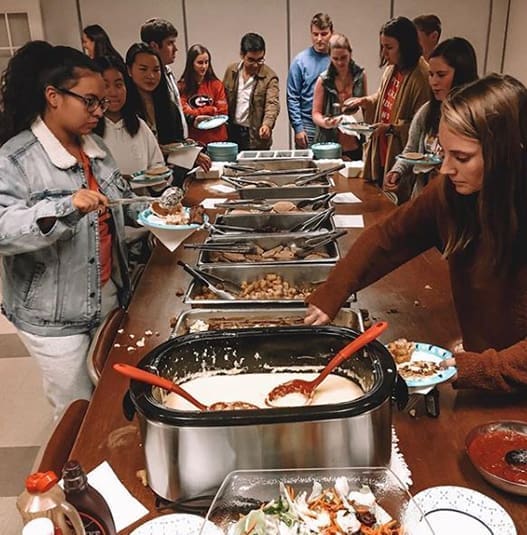
Late night breakfasts are a tradition at the University of Georgia Catholic Center. Volunteers begin to serve food at 8 p.m. to about 150 students each night of finals week. Community members donate food, snacks, and time to make sure the center is stocked. The center is open for 24 hours during finals week. Photo Courtesy of Catholic Center
Hammock, who had grown up in a Portuguese-Catholic community in Massachusetts, found a richness of spirituality here. She’s been at the Catholic Center since arriving, getting married, having her two children baptized there.
“It’s been a long love story with the Catholic Center and the Franciscans,” she said.
For her, the focus by the Franciscans centers on “a prayer life and a life of activity, of charity, of giving.”
On the edge of the university, the center serves in the city of nearly 130,000 and beyond. Students teach at Oasis Católico Santa Rafaela in a trailer park. Thanksgiving is celebrated at Denney Towers, an assisted living facility for the elderly. Students spend alternative spring breaks to take on social justice challenges.
Food is a part of the center’s tradition. The doors are swung open wide during exams when students help themselves to plates heaping with breakfast around midnight.
“At exam time, everyone is Catholic,” joked Father Frank.
Though camaraderie is built around the food, the center targets a serious need too. Some 7,000 students are food insecure, reported campus publications. The hospitality as well as the center’s food pantry help students stretch meal budgets, said Father Frank.
Catherine Clutter is a professor at the University of Georgia Law School. She and husband, Mike, worship at the center, and their three children received the sacraments there.
Clutter, 57, said she’s found a faith community where “social justice is a primary tenet.”
The activism comes out of a faith that casts a wide net. At an adult Bible study, people are encouraged to be open to all different sources of faith.
“It encourages you to keep reading, to keep exploring your faith,” she said.
Brown is a trained anthropologist and data analyst. A former religious education director there, she served on a committee of two dozen members to guide the center through the transition.
The center succeeds because the community, the students and the friars, all have a voice, she said.
“The Franciscans have always targeted ministry to the undergrad and grad students and the professors and families, but they always facilitated cooperative leadership in every aspect,” Brown said.
For Ronczkowski, that long-ago BBQ began his life at the center. Now a rising senior and a member of a Christian fraternity, Ronczkowski is at the center daily.
“They are my family. I get distracted by everybody,” he said. “I go in there and talk with anyone and don’t get work done.”
